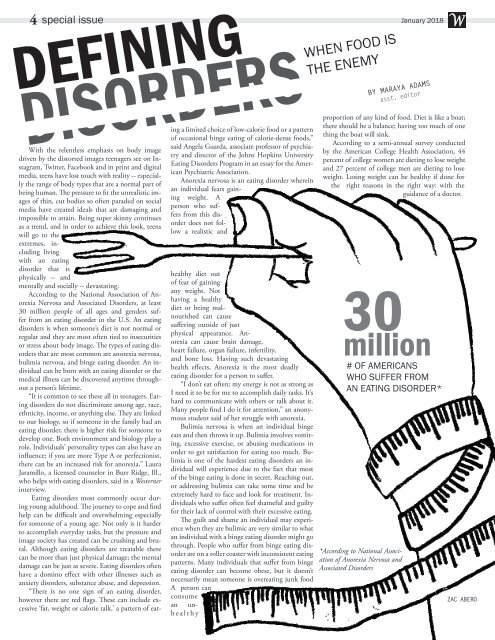You also want an ePaper? Increase the reach of your titles
YUMPU automatically turns print PDFs into web optimized ePapers that Google loves.
4 special issue January <strong>2018</strong><br />
W<br />
DEFINING<br />
DISORDERS<br />
WHEN With the relentless emphasis on body image<br />
driven by the distorted images teenagers see on Instagram,<br />
Twitter, Facebook and in print and digital<br />
media, teens have lost touch with reality -- especially<br />
the range of body types that are a normal part of<br />
being human. The pressure to fit the unrealistic images<br />
of thin, cut bodies so often paraded on social<br />
media have created ideals that are damaging and<br />
impossible to attain. Being super skinny continues<br />
as a trend, and in order to achieve this look, teens<br />
will go to the<br />
extremes, including<br />
living<br />
with an eating<br />
disorder that is<br />
physically -- and<br />
mentally and socially -- devastating.<br />
According to the National Association of Anorexia<br />
Nervosa and Associated Disorders, at least<br />
30 million people of all ages and genders suffer<br />
from an eating disorder in the U.S. An eating<br />
disorders is when someone’s diet is not normal or<br />
regular and they are most often tied to insecurities<br />
or stress about body image. The types of eating disorders<br />
that are most common are anorexia nervosa,<br />
bulimia nervosa, and binge eating disorder. An individual<br />
can be born with an eating disorder or the<br />
medical illness can be discovered anytime throughout<br />
a person’s lifetime.<br />
“It is common to see these all in teenagers. Eating<br />
disorders do not discriminate among age, race,<br />
ethnicity, income, or anything else. They are linked<br />
to our biology, so if someone in the family had an<br />
eating disorder, there is higher risk for someone to<br />
develop one. Both environment and biology play a<br />
role. Individuals’ personality types can also have an<br />
influence; if you are more Type A or perfectionist,<br />
there can be an increased risk for anorexia,” Laura<br />
Jaramillo, a licensed counselor in Burr Ridge, Ill.,<br />
who helps with eating disorders, said in a Westerner<br />
interview.<br />
Eating disorders most commonly occur during<br />
young adulthood. The journey to cope and find<br />
help can be difficult and overwhelming especially<br />
for someone of a young age. Not only is it harder<br />
to accomplish everyday tasks, but the pressure and<br />
image society has created can be crushing and brutal.<br />
Although eating disorders are treatable there<br />
can be more than just physical damage; the mental<br />
damage can be just as severe. Eating disorders often<br />
have a domino effect with other illnesses such as<br />
anxiety disorders, substance abuse, and depression.<br />
“There is no one sign of an eating disorder,<br />
however there are red flags. These can include excessive<br />
‘fat, weight or calorie talk,’ a pattern of eating<br />
a limited choice of low-calorie food or a pattern<br />
of occasional binge eating of calorie-dense foods,”<br />
said Angela Guarda, associate professor of psychiatry<br />
and director of the Johns Hopkins University<br />
Eating Disorders Program in an essay for the American<br />
Psychiatric Association.<br />
Anorexia nervosa is an eating disorder wherein<br />
an individual fears gaining<br />
weight. A<br />
person who suffers<br />
from this disorder<br />
does not follow<br />
a realistic and<br />
healthy diet out<br />
of fear of gaining<br />
any weight. Not<br />
having a healthy<br />
diet or being malnourished<br />
can cause<br />
suffering outside of just<br />
physical appearance. Anorexia<br />
can cause brain damage,<br />
heart failure, organ failure, infertility,<br />
and bone loss. Having such devastating<br />
health effects, Anorexia is the most deadly<br />
eating disorder for a person to suffer.<br />
“I don’t eat often; my energy is not as strong as<br />
I need it to be for me to accomplish daily tasks. It’s<br />
hard to communicate with others or talk about it.<br />
Many people find I do it for attention,” an anonymous<br />
student said of her struggle with anorexia.<br />
Bulimia nervosa is when an individual binge<br />
eats and then throws it up. Bulimia involves vomiting,<br />
excessive exercise, or abusing medications in<br />
order to get satisfaction for eating too much. Bulimia<br />
is one of the hardest eating disorders an individual<br />
will experience due to the fact that most<br />
of the binge eating is done in secret. Reaching out,<br />
or addressing bulimia can take some time and be<br />
extremely hard to face and look for treatment. Individuals<br />
who suffer often feel shameful and guilty<br />
for their lack of control with their excessive eating.<br />
The guilt and shame an individual may experience<br />
when they are bulimic are very similar to what<br />
an individual with a binge eating disorder might go<br />
through. People who suffer from binge eating disorder<br />
are on a roller coaster with inconsistent eating<br />
patterns. Many individuals that suffer from binge<br />
eating disorder can become obese, but it doesn’t<br />
necessarily mean someone is overeating junk food<br />
A person can<br />
consume<br />
an unhealthy<br />
FOOD IS<br />
THE ENEMY<br />
BY MARAYA ADAMS<br />
asst. editor<br />
proportion of any kind of food. Diet is like a boat;<br />
there should be a balance; having too much of one<br />
thing the boat will sink.<br />
According to a semi-annual survey conducted<br />
by the American College Health Association, 44<br />
percent of college women are dieting to lose weight<br />
and 27 percent of college men are dieting to lose<br />
weight. Losing weight can be healthy if done for<br />
the right reasons in the right way: with the<br />
guidance of a doctor.<br />
30<br />
million<br />
# OF AMERICANS<br />
WHO SUFFER FROM<br />
AN EATING DISORDER*<br />
*According to National Association<br />
of Anorexia Nervosa and<br />
Associated Disorders<br />
ZAC ABERO


















